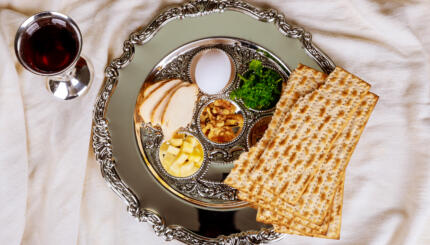Passover is among the most celebrated of Jewish festivities, a time when families typically gather together from wherever they may be dispersed to engage in the ritual retelling of the exodus from Egypt.
Circumstances don’t always allow for large gatherings, yet Jewish tradition tells us that we are still obliged to retell the story of our ancestors’ liberation. According to Maimonides, even if one is alone on the Seder night, he must ask himself the question: Why is this night different?
At a time when many people may be celebrating the holiday of freedom alone or in small groups, here are six tips for hosting a solo seder.
Get ready in advance: You might not have family and friends with you in person, but they can join you in spirit. For each of the 15 steps of the Seder, invite your loved ones to contribute something in writing — a thought, a wish, a teaching — and send it to you by mail (or email and then print it out). When you arrive at each step in the Seder, open the corresponding message. This can function as its own family commentary on the Haggadah, a virtual “conversation” you can hold at your table.

Help us keep Jewish knowledge accessible to millions of people around the world.
Your donation to My Jewish Learning fuels endless journeys of Jewish discovery. With your help, My Jewish Learning can continue to provide nonstop opportunities for learning, connection and growth.
Share rituals from afar: Most of us have favored holiday rituals that we cherish. What are the rituals that are most important to you? It might not be a perfect substitute, but consider connecting with friends and family with whom you have shared the holiday in the past and agree to do a few things at the same time. Maybe everybody sings Dayenu in funny voices or makes a matzah sandwich with jam or beats each other with green onions in the Persian Jewish style. Agree that everyone will do these rituals at a particular hour. It may not quite be the togetherness we prefer, but it’s togetherness of a sort.
What’s for dinner?: Food prep is easily one of the most stressful parts of Passover, but you’re dining alone this year, so take it easy. Jewish law permits cooking on Passover, so you can make scrambled eggs for dinner and call it a day if you like. Of course there’s nothing wrong with preparing a sumptuous meal for one if you have the energy and the desire. But there are also plenty of pared down dishes you can make that won’t stress you out.
Lean into it: One of the central customs of the Passover Seder is to recline in one’s chair as a sign of our comfort and freedom. At a crowded table, this often requires an awkward dance and participants contort themselves uncomfortably in their chairs. With a small crowd, you can really (ahem) lean into this tradition. You can even get up from the table and sprawl across the floor or on a pile of pillows stacked by on the floor.
No Haggadah Loyalty: With a seemingly ever expanding crop of Haggadahs on the market choosing one for your holiday table can be overwhelming. This year, you can embrace the chaos and use them all. Just stack them on the table before you begin and go for it. You can even use a different Haggadah for different sections of the Seder.
Hide and seek for one: One of the highlights of the Seder is the afikomen, the piece of matzah that is traditionally hidden by the children, leading to a house-wide search (and sometimes extortionary bargaining). How do you do that solo? Try hiding it before the holiday — you’ll probably forget where you put it by the time you need it. Or get some empty boxes, place the afikomen in one, then hide them all. Searching for the afikoman will be a bit more engaging as you won’t know when and where you’ll find it.
Adapted from A Different Pesach: Ideas for Solo and Small Sedarim, a collaboration between Marc Fein, Temim Fruchter, Jael Goldstein, Adina Gerver, Talya Housman, Rabbi Louis Polisson, Rabbanit Dasi Fruchter, Stephanie Hoffman, Hadassah Wendl, and Rachel Woolf. For the full guide, click here.



